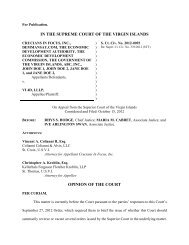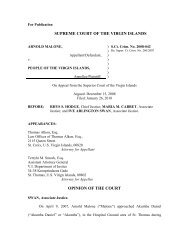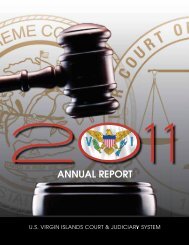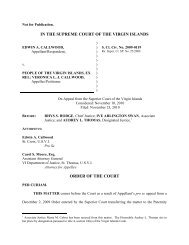IN THE SUPREME COURT OF THE VIRGIN ISLANDS OPINION OF ...
IN THE SUPREME COURT OF THE VIRGIN ISLANDS OPINION OF ...
IN THE SUPREME COURT OF THE VIRGIN ISLANDS OPINION OF ...
Create successful ePaper yourself
Turn your PDF publications into a flip-book with our unique Google optimized e-Paper software.
Watts v. Two Plus Two, Inc.S.Ct. Civ. No. 2007-127Concurring OpinionPage 7 of 23(3d Cir. 1988)). In the Third Circuit, 5 no single factor is determinative of whether a caseshould be dismissed; therefore, a balancing of all the factors and a review of the completerecord determine whether a court should dismiss a case for lack of prosecution. See, e.g,Poulis, 747 F.2d at 868. Accordingly, I apply the six Poulis factors to assess whether thetrial court abused its discretion when it granted Appellees’ Motion to Dismiss for Failure toProsecute.A. The Extent of a Party’s Personal ResponsibilityThe first factor, the extent of a party’s personal responsibility, focuses on theparty’s conduct when examining whether the party was responsible for the actions orinactions that led to dismissal of the case. Adams, 29 F.3d at 873; Mulbah, 261 F.3d at 589;Norden, 375 F.3d at 255. No evidence exists in the trial record to suggest that Appellantwas personally responsible for the delays or any failure to comply with court orders ordiscovery requests. In citing Poulis as a basis for dismissing the case for failure toprosecute, Appellees do not proffer any argument suggesting that Appellant was personallyresponsible for any act or omission that warrants dismissal of Appellant’s case. (See TwoPlus Two, Inc.’s Motion to Dismiss for Failure to Prosecute and IncorporatedMemorandum of Law; J.A. at 48); (See also Trial Tr., 8, 10, 15, Sept. 18, 2007.)5 Other jurisdictions have applied factors that are very similar to the Third Circuit’s Poulis factors, as well asadditional factors that the Third Circuit does not take into account in determining whether a case should bedismissed for failure to prosecute under Rule 41(b) of the Federal Rules of Civil Procedure. See, e.g. U.S. ex rel.Drake v. Norden, 375 F.3d 248, 255 (2d Cir. 2004) (The United States Court of Appeals for the Second Circuitbalances five factors to consider whether a case should be dismissed for failure to prosecute); Mulbah v. DetroitBd. of Educ., 261 F.3d 586, 589 (6th Cir. 2001) (The United States Court of Appeals for the Sixth Circuitbalances four factors to assess the appropriateness of a court’s decision to dismiss a case for failure toprosecute); Estate of Spear v. C.I.R., 41 F.3d 103, 112 (3d Cir. 1994) (“Some courts have held that willfulnessor bad faith is always required before dismissal is an acceptable sanction.”) (citing Ford v. Fogarty Van Lines,Inc., 780 F.2d 1582, 1583 (11th Cir. 1986); Wilson v. Volkswagen of America Inc., 561 F.2d 494 (4th Cir.1977); Telectron, Inc. v. Overhead Door Corp., 116 F.R.D. 107 (S.D.Fla. 1987); United States v. SumitomoMarine & Fire Ins., Co., 617 F.2d 1365, 1369 (9th Cir. 1980)).
















